Introduction
Navigating the challenges of raising a child with autism can be overwhelming, but service dogs offer invaluable support that extends beyond traditional therapies and interventions. These specially trained companions provide a crucial safety net, significantly reducing the risk of wandering and ensuring the child's security in public spaces. The profound benefits of service dogs are not limited to physical safety; they also enhance emotional well-being, foster social connections, and improve the overall quality of life for the entire family.
Through their unwavering companionship and specialized skills, service dogs play a transformative role in the lives of children with autism, offering both practical assistance and emotional comfort. This article delves into the multifaceted advantages of autism service dogs, highlighting their impact on physical safety, emotional support, social development, and the comprehensive training that makes them indispensable family members.
Physical Safety and Security Benefits
Assistance animals provide a crucial safety net for youngsters with autism, greatly minimizing the danger of wandering – a frequent worry among guardians. These specially trained canines ensure their handlers stay nearby, promptly notifying parents if the youngster tries to leave a designated area. This additional layer of security allows parents to navigate public spaces with greater ease, knowing their child is less likely to stray into dangerous situations.
The influence of assistance animals goes further than security. A study by Dr. Maggie O’Haire’s lab, published in Frontiers of Psychiatry, highlights the extensive advantages these canines offer to the whole household. The presence of an assistance dog not only supports the child with autism but also enhances family resilience, improves emotional well-being, and fosters joyful interactions. Families with assistance animals report enhanced social connections and a reduction in instances of judgment and stigma.
One notable example is Sawyer Marston from South Portland. His assistance dog, Emmitt, has been a transformative presence, aiding with daily tasks that were previously challenging. Emmitt’s training includes turning on lights, fetching items, and providing comfort, significantly improving Sawyer’s independence and quality of life.
The significant beneficial influence of assistance dogs on households with autistic individuals highlights the significance of these canine partners. They are not just pets but essential members of the household, contributing to overall well-being and security.
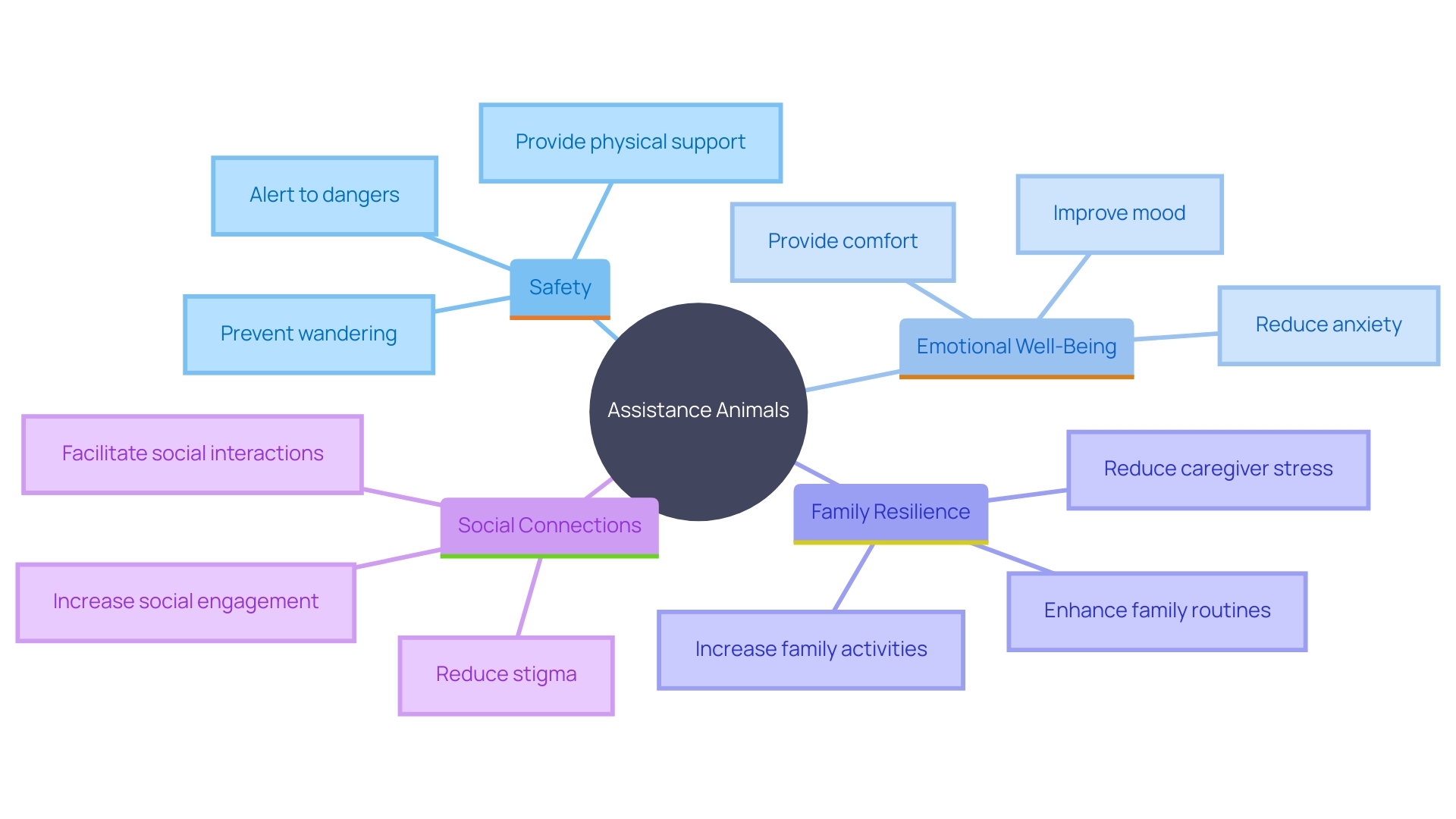
Emotional Support and Stress Reduction
The connection between a young person with autism and their assistance dog can be exceptionally deep, providing advantages that reach far beyond the individual to the whole family. These canines provide unwavering affection and companionship, which can assist in reducing feelings of anxiety and stress. The simple presence of a assistance animal offers reassurance in stressful situations, generating a soothing effect that aids youngsters in managing their feelings more efficiently.
A research article released in Frontiers of Psychiatry, examining accounts shared by guardians of youngsters with autism, emphasizes the wider influence of assistance animals. Discoveries indicate that assistance animals not only aid the child but also improve the emotional health of the whole household. Assistance animals are regarded as family members, fostering resilience by enhancing interactions and providing a source of joy. The qualitative method of the research highlights the significant positive influence of assistance animals, presenting them as distinct and tailored interventions that improve social ties and diminish feelings of judgment and stigma.
Furthermore, the research highlights that assistance animals assigned for autism are trained for various duties such as fetching, carrying, delivering dropped items, responding to instances of self-stimulatory behavior, providing calming deep pressure, and encouraging social interaction. This extensive support network, involving the youth, the assistance dog, and a facilitator, further illustrates the diverse advantages of assistance dog placements, reinforcing their role in enhancing the lives of individuals with autism and their families.
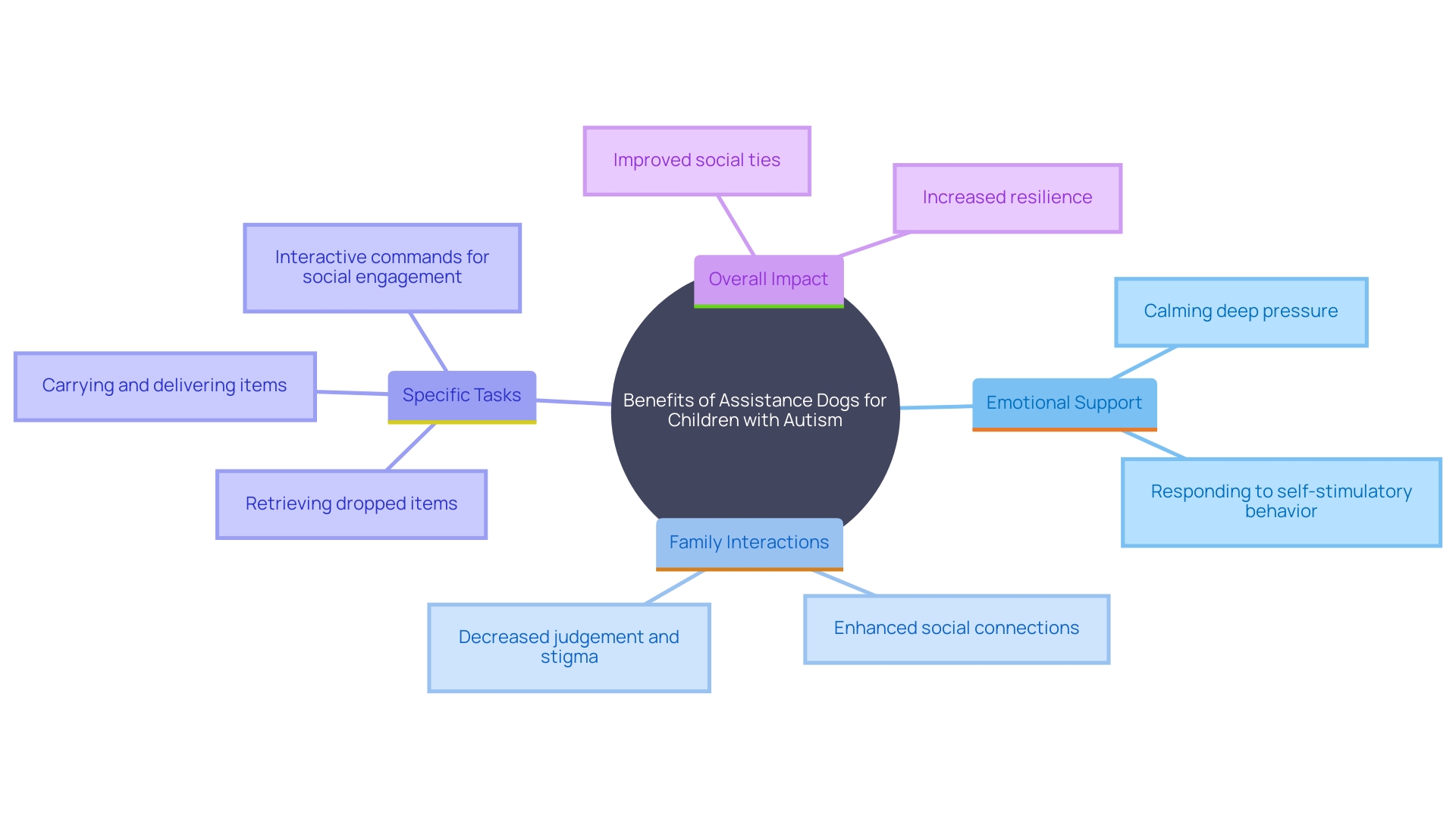
Social Development and Communication Skills
Service dogs play a crucial role in facilitating social interactions for youngsters with autism, acting as a bridge between them and their peers. The presence of an assistance dog naturally attracts notice and initiates discussions, offering youngsters with autism valuable chances to practice and improve their social abilities. 'As indicated by research released in Frontiers of Psychiatry, therapy dog placements have been demonstrated to notably enhance social connections and diminish feelings of judgment and stigma for these individuals and their relatives.'. The qualitative method of the research, which involved interviewing guardians of youngsters both with and awaiting assistance animals, showed that these animals function as more than merely friends; they are essential to the household, promoting resilience and happiness and enhancing overall emotional health. Assistance animals are regarded as family members and are crucial in fostering a sense of belonging and safety, allowing children to interact more confidently with their surroundings.
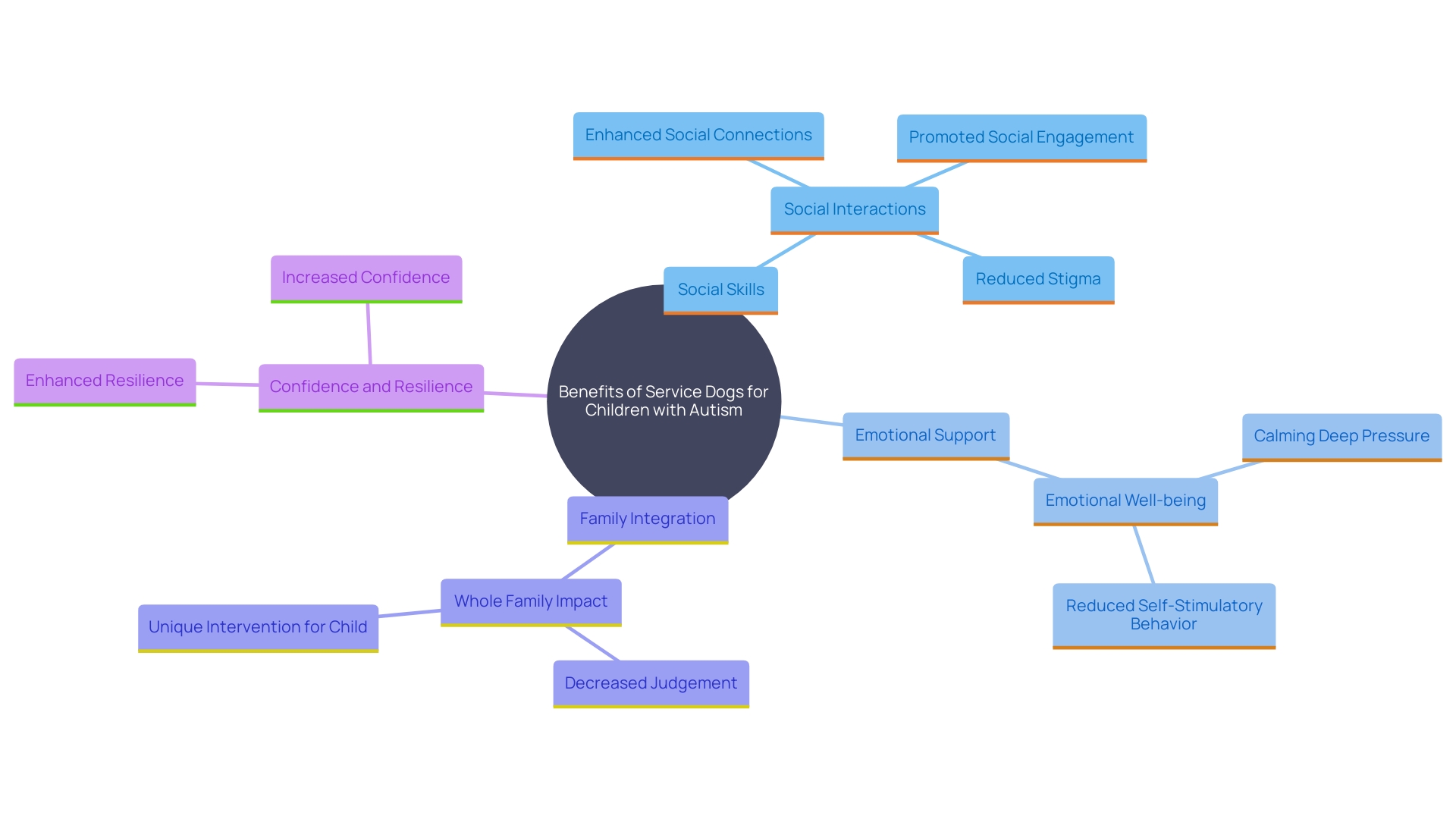
Training and Tasks of Autism Service Dogs
Autism assistance canines undergo intensive and specialized training to address the distinct requirements of their handlers. These canine companions are adept at performing tasks such as providing deep pressure therapy during moments of distress, guiding their handlers through crowded spaces, and interrupting self-injurious behavior. The comprehensive training these animals undergo equips them to support their handlers in various daily activities, significantly enhancing independence.
A joint research published in Frontiers of Psychiatry examined the significant influence of assistance animals within the context of the whole household. Results showed that assistance animals not only aid the child with autism but also enhance the household's emotional health and strength. The presence of an assistance dog fosters joy, improves interactions, and helps reduce experiences of judgment and stigma. This research emphasizes the wider advantages of assistance animals, showcasing their importance as essential family members.
Research has also indicated that assistance animals can improve social connections and lessen mental health disorders, particularly for individuals diagnosed with autism in adulthood. The increasing demand for these animals indicates a heightened understanding and acceptance of mental health issues. As Vicky Spadoni, Executive Director of Autism Dog Services, notes, “People are more transparent about their mental health than they used to be, which is a good thing.”
Overall, the placement of service dogs for autism is a transformative intervention, providing invaluable support to both individuals with autism and their families.
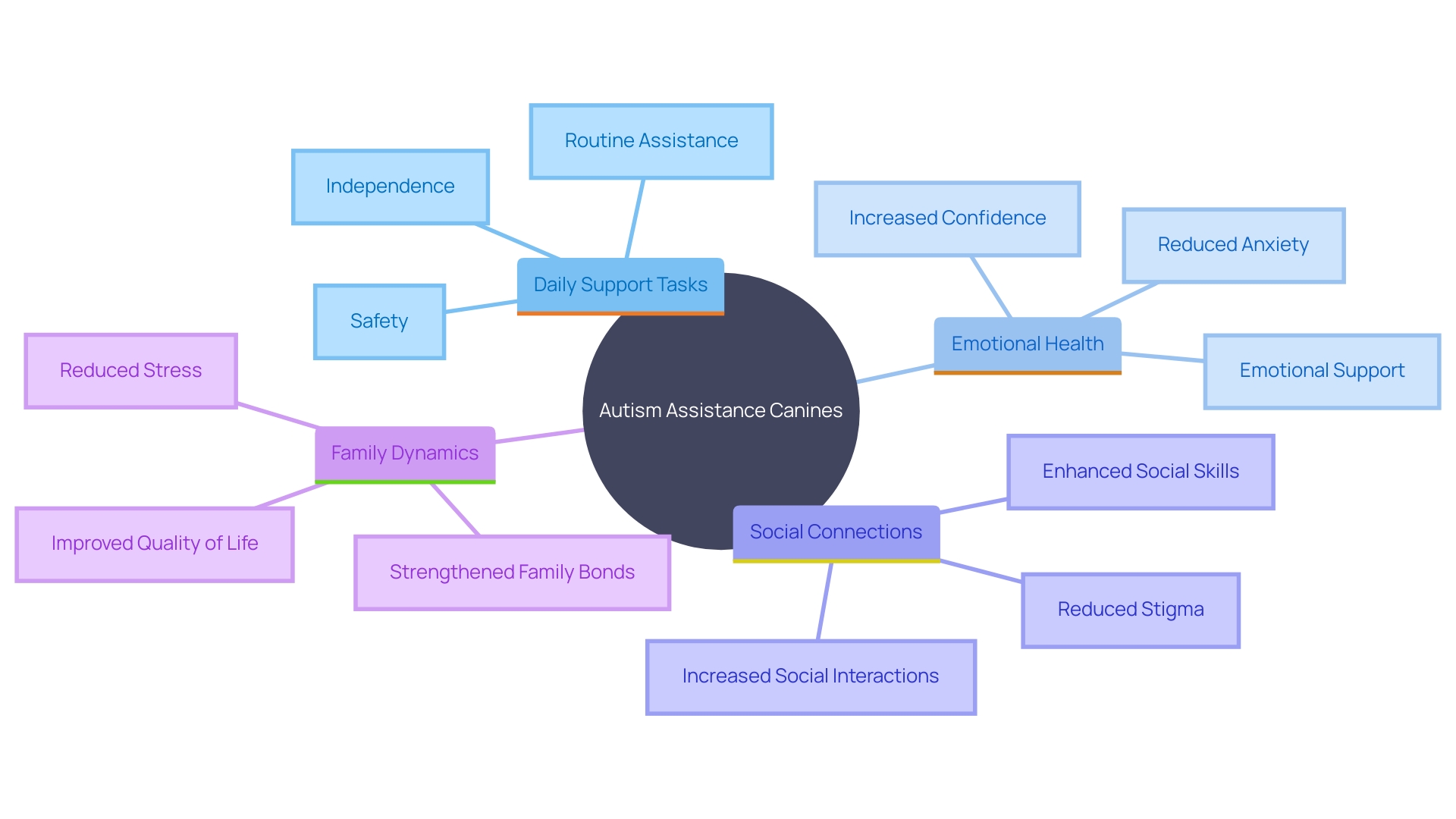
Research Findings on the Efficacy of Autism Service Dogs
New studies highlight the profound influence of assistance animals on youngsters with autism and their households. 'A thorough research conducted by Dr. Maggie O’Haire’s laboratory at the University of Arizona, published in Frontiers of Psychiatry, shows that assistance canines not only lessen anxiety and enhance emotional management in youngsters with autism but also improve the overall quality of life for households. The results emphasize that assistance animals function as distinct, personalized strategies that promote social bonds, lessen feelings of criticism and bias, and enhance emotional health for the whole family group.
The research investigated experiences shared by caregivers of youngsters with autism who already possess a support dog and those on a waiting list to obtain one. This qualitative approach provided a richer understanding of the broader impact of assistance animals beyond the child with autism. Assistance animals were regarded as essential members of the household, enhancing resilience, improving interactions, and bringing happiness within the home. These animals play a critical role in enhancing social engagement, managing challenging behaviors, and providing comfort during stressful situations.
Furthermore, the research results correspond with wider studies that show elevated levels of oxytocin, a hormone linked to social connections, in youngsters engaging with their pet dog as opposed to playing independently with toys. This illustrates the profound positive effect of assistance dogs on emotional and social well-being. Canine Companions, a leading organization in service dog placements, emphasizes the profound positive impact on families, fostering resilience and improved quality of life for children with autism and their families.
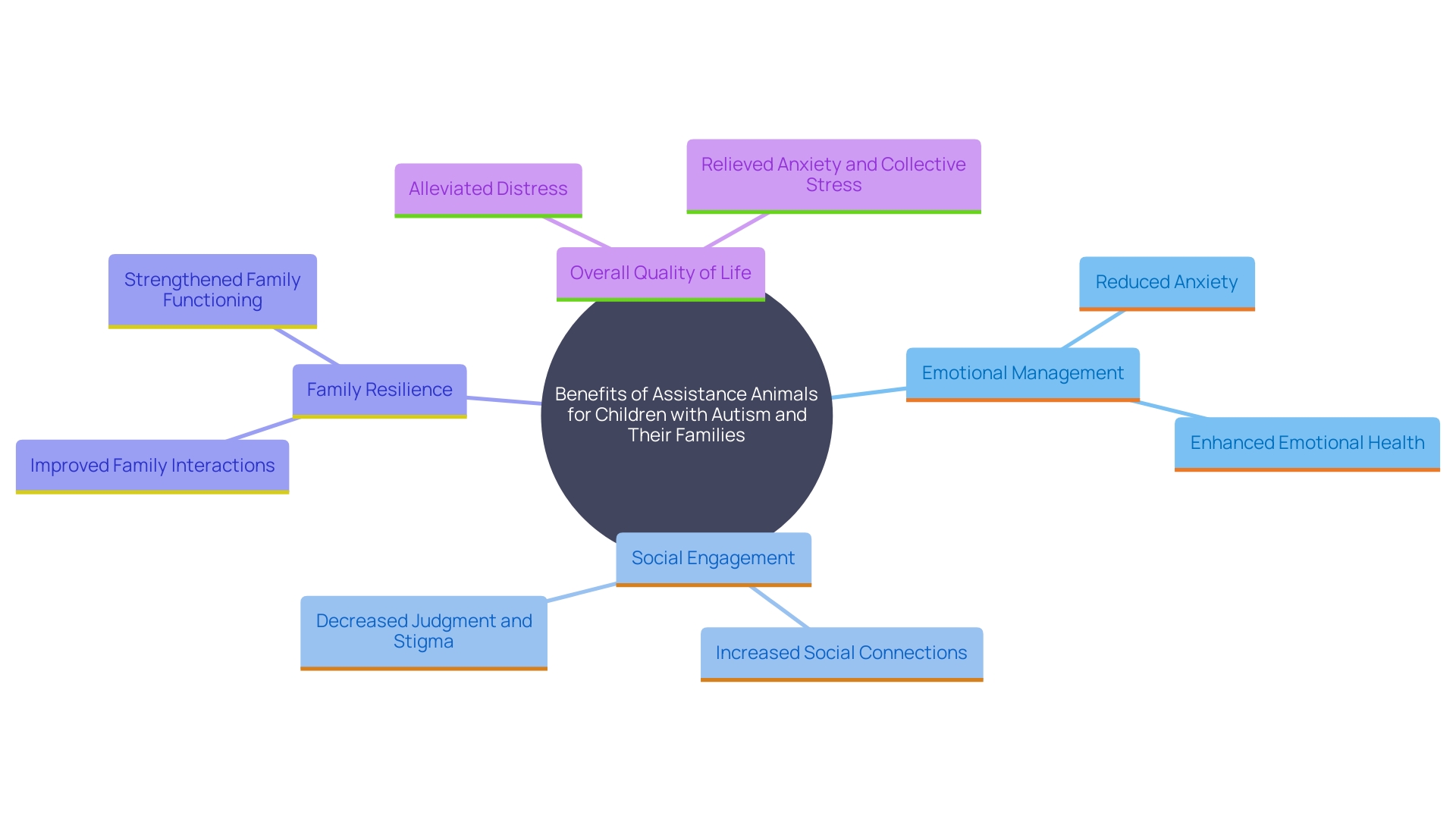
Conclusion
Service dogs profoundly impact children with autism and their families, providing essential physical safety and emotional support. These trained companions significantly reduce the risk of wandering, allowing parents to feel more secure in public spaces. Their ability to alert caregivers and assist with daily tasks enhances the child's independence, fostering a sense of safety for the entire family.
The emotional benefits are equally significant. Service dogs offer unconditional love and companionship, helping to alleviate anxiety and stress for both the child and their family. Research shows that these dogs improve overall quality of life, strengthen family bonds, and create opportunities for social connections, reducing stigma and promoting community engagement.
Additionally, service dogs play a crucial role in social development. They facilitate interactions by acting as a bridge between children and their peers, allowing for the practice and enhancement of social skills. Their rigorous training enables them to perform various supportive tasks that make them vital family members.
In summary, the transformative role of service dogs in the lives of children with autism is undeniable. They enhance emotional well-being, improve safety, and foster social connections, making the journey to secure a service dog a crucial step for families facing the challenges of autism. Recognizing the comprehensive benefits these canine companions provide empowers families and ensures the well-being of their children.




